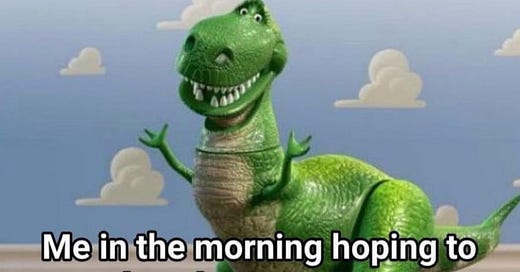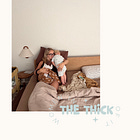I'm not a gentle parent. So, what am I?
Frankly I'm sick of being told how to raise a 'good human'—as if what I'm doing already is encouraging the opposite.
‘In The Thick Of It’ is an entirely reader-supported and funded publication—so if you’d like to continue to receive content and have access to the full archive, consider supporting my work with a paid subscription.
If you’re a parent reading this, then like me you’re no doubt assaulted with parenting advice on the daily. From Instagram memes poking fun at the exhaustion that is motherhood, to tips on how to create the perfect ‘Bento’ lunchbox as well as the constant (and conflicting!) sleep advice—it’s all there, screaming in our faces.
And although I don’t mind dipping my toe into the bits and pieces that feel relevant to me, what I have a huge issue with is the judgment and constant berating I feel subject to from parenting blogs and influencers telling me that I should be gentle parenting. The determination being that if I don’t practise gentle parenting, I’m screwing up my children from now until the end of time.
While there’s no question that our generation is working hard to dismantle some of the ‘less than perfect’ parenting practices implemented by our parents’ and grandparents’—ie that children should be seen and not heard, that crying is sign of weakness or that doing anything ‘like a girl’ is a bad thing—we shouldn’t be publicly dragged just because we lost our cool and yelled at our toddler after they refused to listen for the 417th time.
I already feel swamped by mum guilt when I know I’ve unnecessarily raised my voice at a toddler who really did nothing more than cross the path of my bad mood, rather than instigate it. I already feel the heavy shame of knowing I’ve been too rough relocating a child from the floor mid-tantrum, perhaps squeezing a pudgy arm a little too firmly simply because I’m at my wits end. I feel it already. It’s in my bones. So what I don’t need is to be told by the internet that I’ve broken my child or disrupted their ability to develop into a fully functioning member of adult society simply because I haven’t held enough space for their emotions or allowed them to decide when to put their shoes on and leave the house.
Instead, what’s most important to me is that I have the self-awareness and exhibit enough vulnerability to work hard at the repair—doing my best to explain to said toddler why I was upset/angry/[insert complicated emotion here] and following it up with a cuddle.
Advocates for gentle parenting argue that, on a basic level, children feel empowered due to being encouraged to make their own choices, fostering a strong sense of self and independence. And ultimately, gentle parenting puts the child in the driver’s seat—allowing them to lead the way.
However, for those of us who are perhaps pressing up against some of gentle parenting’s deeper-set doctrines, we could argue that the absence of firm boundaries or a sense of consistency actually results in children who lack self-control, struggle to make decisions and misunderstand the consequences that accompany some of their choices. Put simply, if children are allowed to effectively decide whatever they want to do and do it—they may also lack the understanding of what it feels like to be held accountable or responsible for their actions.
Personally, I would also argue that while gentle parenting places emphasis on encouraging self-control and the self-regulation of emotions by ‘holding space’, the absence of any boundaries and an endless stream of choices may actually make it more difficult for a child to make a “quote, unquote” good decision. If my four year old decides to hit his one year old sister because she’s playing with a toy that he wants for no other reason than ‘just because’, I’m not prepared to get down on his level and validate his emotions as being more important than hers. Sure, I can explain that sharing is hard but violence—in any form—is a firm boundary that I’m not willing to bend. This may sound harsh, but I don’t think that on a fundamental level there’s anything wrong with this approach and I’m hopeful that by cultivating a more comprehensive understanding of action, consequence and accountability, I’m also going to raise a human that’s not only ‘good’, but resilient in the face of adversity.
In many respects, it’s also difficult to turn a blind eye to the long-term repercussions of remaining strictly focused on a gentle parenting approach as in some situations, I can imagine that growing up constantly having your emotions validated and whims attended to would result in a fairly entitled adult who perhaps lacks a deeper emotional intelligence because they’ve never been told to consider another person’s feelings, choices or personal boundaries as more important than their own?
Interestingly, there is actually research to support this—illustrating that children who grow up with this sense of entitlement because perhaps they were over-indulged or over-parented, grow up to be less empathetic, with a weaker work ethic and behavioural patterns that illustrate they are ‘above’ the rules.
That’s not to say that the flipside of gentle parenting—or a more authoritarian approach where children are expected to obey and adhere to strict boundaries without question—is the answer.
In fact, research now shows that an authoritative style of parenting results in poorer outcomes for children, including increased hyperactivity, conduct problems and emotional symptoms.
But surely, there is a happy middle ground where we can foster two-way communication with our children while also setting healthy boundaries?
When discussing some of the pitfalls of gentle parenting with a few trusted friends, one friend actually confided that she has previously struggled when navigating interactions with other children who are clearly being raised by more gentle parents than she would describe herself to be. She says:
“When I’ve asked children of gentle parents to do something—irrespective of the reason I provide—I’ve been met with responses ranging from complete silence, to eye rolls and even statements like: you’re not my mum so I don’t have to listen to you.”
I mean, how would a gentle parent recommend she respond to that?
I must admit that I also find it difficult at times to encourage my own children to regulate their emotions and encourage their independence whilst also teaching them that the boundaries my husband and I have put in place as their parents are there for a reason when—from their POV—it appears their friends and peers are allowed to run wild. There have been times when I’ve visibly registered the confusion on my four year old’s face as I’ve calmly asked him to stop doing something when, mere steps away, his playmate is engaging in the exact behaviour I’ve asked him to cease. It’s undoubtedly confusing for his little mind to comprehend and process but when he asks me why, it’s also difficult for me not to embody my best boomer-impersonation and simply shout at him: because I said so!
Regardless of our personal parenting philosophy however, surely we can all agree that the end goal is to raise happy, healthy humans that feel safe, secure and loved. We absolutely need to be sensitive and attuned to our child’s individual emotions and needs, but I also don’t want to be told by strangers online that I’m doing it all wrong—or, that by upholding my boundaries I’m screwing up my child and causing them a deep, gaping trauma that they’re going to have to unpack in therapy during adulthood.
It’s true that as Millenials we have a reputation for being somewhat anxious ‘over-thinkers’—and that surely extends into the realm of parenting—but we’re also the first generation to be considered ‘digital natives’, living a large portion of our lives online. So while we have access to more up to date information and cutting-edge science—with the ability to actively implement the ‘know better, do better’ philosophy—when it comes to raising our kids, there is also so much added pressure that falls our way.
We’ve grown up with the rise of mummy bloggers, picture-perfect Instagram feeds and Pinterest boards carefully curated to persuade us why having the perfect nursery or most expensive baby carrier will make us a better parent. Even from a purely superficial point of view it’s a lot to digest before you even consider the extra layers of conflicting parenting styles and advice we’re thrust on a daily basis.
The bottom line is, we should all be allowed to raise our kids in whatever way works best for us, our beliefs and our family. Sure, our friend’s parenting philosophy might not align neatly with our own, but such is life. We learn to navigate these challenges and move on. But what is most important is that no matter our beliefs, we all acknowledge openly that there is more than one way to raise a child to thrive. Gentle parenting is not the only way. And for those of us who perhaps don’t feel the term accurately captures our own philosophy of child-rearing, the question remains: if I’m not a gentle parent, what am I?
I just hope there is more support than shame to be found in the response.










I can do resonate with this! It’s that feeling of failure that we impose on ourselves when we feel we can’t get it right no matter what label we choose. And I agree that gentle parenting techniques are inevitably trickier as they get older… it’s a constant evolution! Thank you for reading 🙏
Mmmmm yes! I have found myself feeling the sting of self disappointment as I ‘fail’ to stay 100% gentle after reading the books and of course wanting to do the best for my girls. I try and focus on respect and kindness… but also often find myself in the repair stage because my capacity to hold it all reaches its limits. I also have found that a lot of the ‘gentle parenting’ techniques worked well for the first few years but not so great now she is 4.5! It’s a different phase when they can articulate things more I’ve found. I think any label is harmful as it gives us a standard we have to try and perfect and can simply lead to us feeling like crappy Mothers when of course we never intentionally want to do wrong by our children. Thank you for talking about this. Xxx